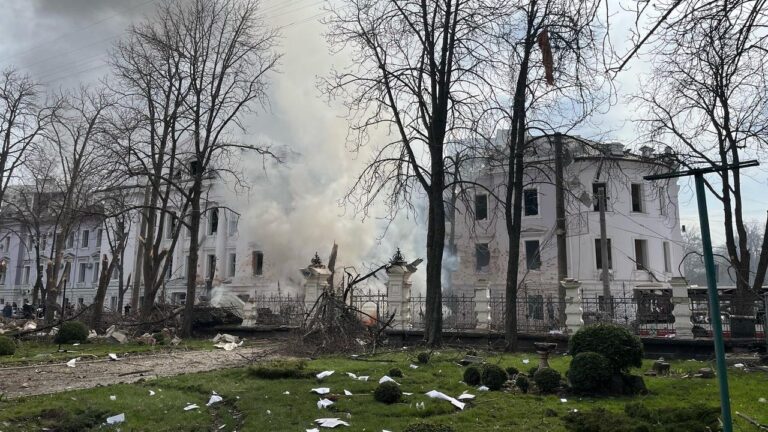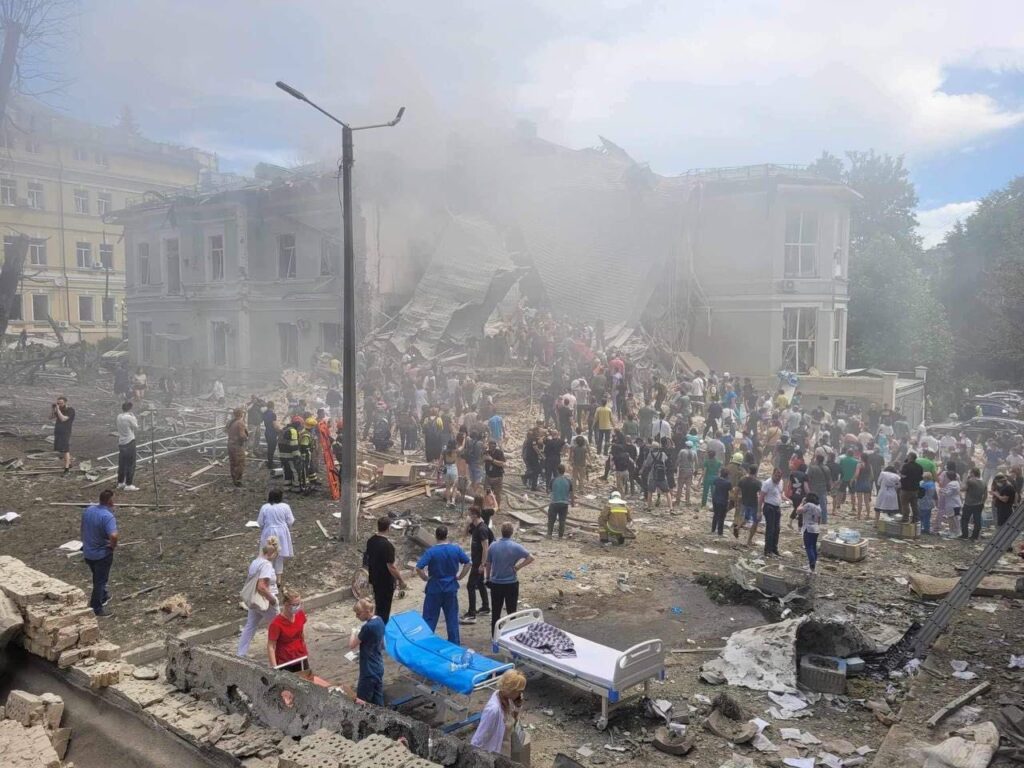On [March,13], Russian forces launched a missile strike on the city of Sumy, targeting civilian infrastructure and causing significant casualties. The attack, far from a military front line, highlights a continuing Russian strategy of deliberate assaults on non-combatant populations.
1. Strategic Reasons Behind Civilian Targeting
1.1 Psychological Warfare and Demoralization
Russia’s systematic attacks on cities like Kyiv, Kharkiv, Odesa, and now Sumy serve a strategic objective: to terrorize the Ukrainian population and erode public morale. These strikes aim to:
- Overwhelm local emergency systems.
- Create internal displacement and refugee flows (Like in other parts of the world incl. Syria).
- Pressure the Ukrainian government into concessions by increasing domestic suffering.
1.2 Resource Depletion and Civil Defense Disruption
By targeting power grids, water facilities, hospitals, and schools, Russia seeks to:
- Force Ukraine to spend more on civil defense and infrastructure repair than on military capabilities.
- Undermine the effectiveness of Ukraine’s Western-supplied defense systems by forcing them to respond to dispersed, non-military threats.
1.3 Messaging to the West
Attacks on civilians carry a dual message:
- Internally, they reinforce Putin’s narrative of total war and national survival.
- Externally, they test Western resolve, daring NATO and the U.S. to respond while hinting at the costs of continued Ukrainian support.
2. The Case of Sumy
Sumy, located near the Russian border, has both strategic and symbolic importance. Though far from the current front lines, the strike on Sumy demonstrates:
- Russia’s continued intent to threaten northern Ukraine.
- A psychological return to the early invasion phase, when northern Ukraine was under direct threat.
- Possible attempts to stretch Ukrainian air defense away from the Donbas and Zaporizhzhia regions.
Reports indicate that the attack targeted a university dormitory and nearby residential blocks, killing civilians including children. This underscores the non-military nature of the strike and raises serious questions about Russia’s compliance with international humanitarian law.
3. Implications for a Trump Administration
If Donald Trump returns to the presidency, his administration will face several complex dynamics related to Russia’s civilian-targeting campaign:
3.1 Credibility and NATO Cohesion
- Trump’s previous criticism of NATO raises concerns among allies about the future of Western unity.
- A tepid response to atrocities like Sumy would reinforce fears of U.S. disengagement, weakening deterrence.
3.2 Domestic Political Consequences
- A failure to respond firmly could damage Trump’s standing domestically, particularly among independent voters and the national security establishment.
- However, any overly aggressive posture may conflict with his stated aim to reduce U.S. overseas commitments.
3.3 Room for Strategic Ambiguity
- Trump could leverage the situation for diplomatic positioning—offering de-escalation in exchange for Russian concessions.
- However, this would risk legitimizing Moscow’s tactics and harming U.S. credibility on human rights.
4. Recommended U.S. Responses
Washington’s response should signal resolve while avoiding escalation into direct conflict. Possible actions include:
4.1 Sanctions Expansion
- Target Russian arms manufacturers and technology suppliers involved in missile production.
- Impose secondary sanctions on Chinese or Iranian entities enabling Russia’s drone and missile capabilities.
4.2 Defensive Aid to Ukraine
- Accelerate delivery of air defense systems (e.g., Patriot, NASAMS).
- Supply advanced counter-drone technologies.
- Expand U.S. intelligence sharing to improve early warning and civil protection.
4.3 Legal and Diplomatic Measures
- Push for war crimes documentation and proceedings through the ICC.
- Isolate Russia further at the UN and other global forums.
- Publicly support international humanitarian investigations into the Sumy strike.
4.4 Cyber and Strategic Messaging
- Conduct cyber operations to disrupt Russian targeting networks (in coordination with allies).
- Launch a global information campaign to counter Kremlin narratives and document war crimes.
5. Broader Regional and Global Consequences
- For Europe: The continued targeting of civilians may lead to refugee surges, especially if infrastructure collapses in targeted areas.
- For Global South: Russia’s actions undermine its image as a “protector of sovereignty,” damaging its influence in Africa and Latin America.
- For China: Each strike forces Beijing to either distance itself from Moscow or accept reputational damage by remaining silent.
The Russian missile strike on Sumy is not an isolated event but part of a broader pattern of strategic terror against Ukraine’s civilian population. As such attacks continue, the Kremlin aims to break Ukrainian resolve, destabilize the region, and test the resolve of the West. Whether under the Biden administration or a future Trump administration, the U.S. must develop a clear, strategic, and consistent response to deter further escalation, punish violations of international law, and reaffirm its global leadership.
If the White House ignores the recent Russian missile attack on Sumy, it could have serious strategic, diplomatic, and domestic implications for the United States. Here’s a detailed breakdown:
1. International Credibility Erosion
a. Weakening U.S. Global Leadership
- Silence in the face of clear civilian targeting would undermine the U.S.’s image as a defender of democratic values and human rights.
- It would call into question Washington’s commitment to international law, especially after decades of promoting humanitarian norms in conflicts like Kosovo, Libya, or Syria.
b. Encouragement of Authoritarian Powers
- A lack of response may embolden Russia, China, Iran, or North Korea, all of whom monitor U.S. behavior for cues.
- Russia might interpret silence as permission to escalate further—perhaps by striking other cities like Kharkiv or even Kyiv’s government buildings.
2. NATO and Allied Trust Deficit
- Eastern European allies (especially Poland, the Baltics, and Romania) would feel exposed and question the reliability of U.S. security guarantees.
- Western Europe could push for more autonomy in defense (i.e., through EU initiatives) and reduce reliance on Washington.
- Long-term, it could fracture NATO’s unity and lead to divergent policies toward Russia.
3. Ukrainian Military and Civilian Morale
- Ukrainians would perceive inaction as abandonment, potentially weakening frontline morale.
- Civilian resilience might erode, prompting increased migration, especially toward U.S.-friendly European countries—adding to regional pressure.
4. Domestic Political Fallout
a. From Democrats and National Security Republicans
- Critics would accuse the administration (especially under Trump) of appeasement or weakness in the face of war crimes.
- Bipartisan coalitions in Congress could pressure the administration to reverse course, potentially creating internal conflict.
b. Isolationist Base Satisfaction
- Conversely, a Trump-led administration might receive short-term praise from his base for “staying out of another foreign war.”
- But any future escalation resulting from inaction could backfire politically if the U.S. is eventually forced to intervene more aggressively.
5. Precedent for Future Attacks
- Ignoring Sumy sets a dangerous precedent: future attacks on civilian targets—schools, hospitals, power plants—may be met with the same silence.
- It reduces deterrence, signaling that Russia can escalate without cost, possibly encouraging chemical or cyber attacks on civilian infrastructure.
6. Damage to U.S. Position in the Global South
- Nations in Africa, Asia, and Latin America—already targeted by Russian and Chinese influence campaigns—may see Washington as hypocritical or selective in applying human rights standards.
- This could weaken U.S. soft power and open space for Moscow and Beijing to expand their narratives and partnerships.
7. Legal and Moral Repercussions
- The U.S. has invested heavily in promoting international accountability mechanisms. If Washington is silent on war crimes, it could:
- Undermine its position in institutions like the International Criminal Court (even if the U.S. is not a signatory).
- Give Russia ammunition to discredit Western norms and paint itself as the true defender of multipolarity.
Conclusion: Strategic Inaction is Strategic Risk
Ignoring the Sumy attack would not de-escalate the war or “bring peace closer.” Instead, it would:
- Signal to adversaries that attacks on civilians are not red lines.
- Erode U.S. alliances and global trust.
- Risk entangling Washington in a broader and more dangerous conflict later, when options are more limited.
Strategic silence in this context is not neutrality—it’s a decision with far-reaching and dangerous consequences.
Trump views foreign policy through a transactional lens. In any negotiation with Russia to end the Ukraine war, he likely:
- Focuses on quick results and a “deal” that can be sold domestically as peace through strength.
- De-emphasizes Ukraine’s full sovereignty, pushing Kyiv toward compromise.
- Frames any agreement as a cost-saving move for the U.S. taxpayer, potentially pulling back military aid.
This style appeals to his political base but risks concessions that damage U.S. credibility and long-term interests.
Russia likely sees a Trump return as:
- A strategic opening to end the war without defeat, on favorable terms.
- A chance to divide the West by using U.S. disengagement to weaken NATO’s political coherence.
- An opportunity to frame the war’s end as a Russian diplomatic success, especially if the U.S. pushes Ukraine to concede.
Putin may offer Trump superficial “concessions”—like minor withdrawals or prisoner exchanges—while cementing territorial gains and continuing covert destabilization of Ukraine.
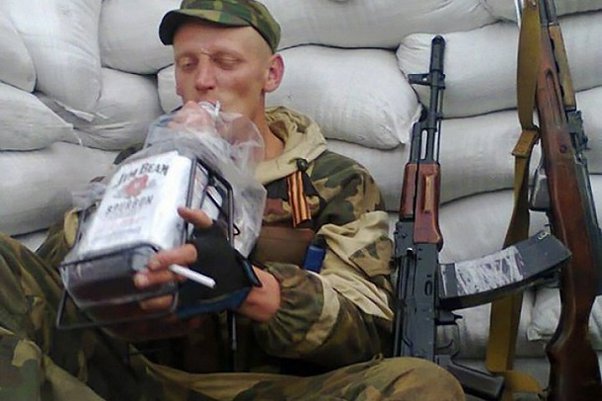
More on this story: War crimes to reflect the essence of Russians
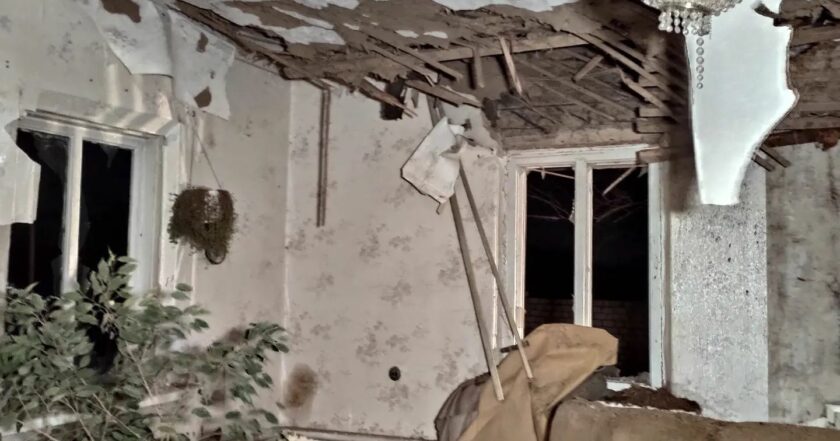
More on this story: Facts proving continued Russia-committed war crimes in Ukraine
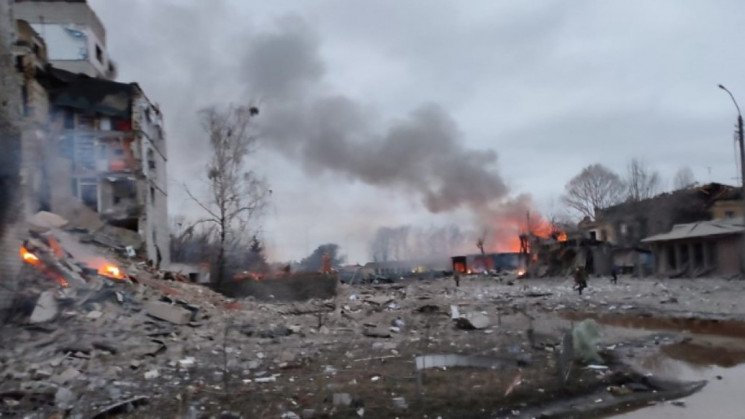
More on this story: Russian military are up to their ears in war crimes in Ukraine


